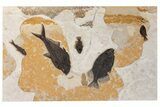47" Green River Fossil Fish "Mural" With Diplomystus & Phareodus
Due to the size and weight of this piece it will be shipped on a pallet or in a crate via freight. Our website cannot automatically calculate freight shipping costs, so these costs will be calculated and billed after purchase. Please contact us prior to purchase if you need a shipping quote.
This is a stunning fossil fish "mural" from the Green River Formation of Wyoming. The entire piece measures 47 x 29" and features a large, 13.8" wide Phareodus sp. (uncommon fish), a 17.4" long Diplomystus dentatus, two Cockerellites (Priscacara) liops fish (5.2" & 4.75"), and a Knightia eocaena fish that measures 6.3" wide. These fossils were collected from Lindgren Quarry near Kemmerer, Wyoming. The 5.2" wide Cockerellites fish at the center of the plate was found naturally preserved within this slab of rock. The remaining fish have all been inlaid.
The entire piece has been backed with wood for stability and includes a wood wall hanger so that it can easily be hung on a wall with horizontal or vertical presentation. It weighs just over 108 lbs and will ship in a wooden crate on a pallet.
About Fossil Lake
50 million years ago, in the Eocene epoch, these fish thrived in Fossil Lake, which was fed by the Uinta and Rocky Mountain highlands. The anoxic conditions at the bottom of Fossil Lake slowed bacterial decomposition, prevented scavengers from disturbing corpses, and, most interestingly, suffocated creatures that ventured into the oxygen-starved aquatic layer. The result is a miraculous exhibition of Eocene biota: a subtropical aquatic community within sycamore forests, teeming with creatures such as freshwater stingrays, dog-sized horses, menacing alligators, early flying bats, and one of the first primates.
50 million years ago, in the Eocene epoch, these fish thrived in Fossil Lake, which was fed by the Uinta and Rocky Mountain highlands. The anoxic conditions at the bottom of Fossil Lake slowed bacterial decomposition, prevented scavengers from disturbing corpses, and, most interestingly, suffocated creatures that ventured into the oxygen-starved aquatic layer. The result is a miraculous exhibition of Eocene biota: a subtropical aquatic community within sycamore forests, teeming with creatures such as freshwater stingrays, dog-sized horses, menacing alligators, early flying bats, and one of the first primates.
$7,950
SPECIES
Phareodus sp., Diplomystus dentatus, Cockerellites (Priscacara) liops & Knightia eocaena
LOCATION
Lindgren Quarry, Kemmerer, Wyoming
FORMATION
Green River Formation
SIZE
Rock: 47 x 29", Diplomystus: 17.4", Phareodus: 13.8", Weight: just over 108 lbs
CATEGORY
SUB CATEGORY
ITEM
#254198
We guarantee the authenticity of all of our specimens.
 Reviews
Reviews




















